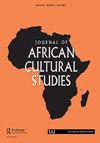Lyrical Renegades: Reframing Narratives of the Covid-19 Pandemic in Kenyan Urban Margins Through Hip-Hop
IF 0.9
2区 社会学
Q2 CULTURAL STUDIES
引用次数: 0
Abstract
ABSTRACT The outbreak of Covid-19 in Kenya saw a resurgence of state policing, violence and repression as the state sought ways of decisively containing the spread. This was accompanied by a discourse of “being at war” with a novel and invisible enemy. As a result, terms such as shutdown, lockdown, curfew and isolation were mobilised by state agents and organs not only to refer to the concerted efforts of dealing with the pandemic; they also served to show the state’s reach and to justify the excessive exercise of power and control. Through the analysis of two hip-hop songs, “Pandemic” by Kitu Sewer featuring Robah, and “Pandemik” by the Ochungulo Family, this article examines the artists’ representation of the state’s idioms of closure and pandemic-mediated violence, while at the same time necessitating a reimagination of sociality, freedom and resistance in Kenya’s urban margins. Analysing the songs’ recourse to Kenyan anti-colonial struggles and ratchetness, I argue that the artists present Nairobi’s margins as war zones where several pandemics intersect. In addition, I contend that the artists invite a rethinking of a collapsing world in the face of multiple pandemics as offering the possibility of regeneration and transformation.抒情反叛者:通过Hip-Hop重新演绎肯尼亚城市边缘新冠肺炎大流行的叙事
摘要新冠肺炎在肯尼亚爆发,国家警察、暴力和镇压死灰复燃,国家寻求果断遏制疫情蔓延的方法。伴随而来的是“与一个新奇而无形的敌人开战”的话语。因此,国家特工和机关动员了关闭、封锁、宵禁和隔离等术语,不仅是指应对疫情的协同努力;他们还展示了国家的影响力,并为过度行使权力和控制辩护。通过对两首嘻哈歌曲的分析,Kitu Sewer以Robah为主角的《Pandemic》和Ochungulo Family的《Pan德米克》,本文考察了艺术家们对国家封闭和疫情引发的暴力的习语的表现,同时也需要重新想象肯尼亚城市边缘的社会性、自由和抵抗。通过分析这些歌曲对肯尼亚反殖民斗争和激烈程度的追索,我认为艺术家们将内罗毕的边缘地带描绘成了几场流行病交叉的战区。此外,我认为,艺术家们邀请人们重新思考一个在多重流行病面前崩溃的世界,因为它提供了再生和转型的可能性。
本文章由计算机程序翻译,如有差异,请以英文原文为准。
求助全文
约1分钟内获得全文
求助全文
来源期刊

Journal of African Cultural Studies
Multiple-
CiteScore
1.70
自引率
10.00%
发文量
13
期刊介绍:
The Journal of African Cultural Studies publishes leading scholarship on African culture from inside and outside Africa, with a special commitment to Africa-based authors and to African languages. Our editorial policy encourages an interdisciplinary approach, involving humanities, including environmental humanities. The journal focuses on dimensions of African culture, performance arts, visual arts, music, cinema, the role of the media, the relationship between culture and power, as well as issues within such fields as popular culture in Africa, sociolinguistic topics of cultural interest, and culture and gender. We welcome in particular articles that show evidence of understanding life on the ground, and that demonstrate local knowledge and linguistic competence. We do not publish articles that offer mostly textual analyses of cultural products like novels and films, nor articles that are mostly historical or those based primarily on secondary (such as digital and library) sources. The journal has evolved from the journal African Languages and Cultures, founded in 1988 in the Department of the Languages and Cultures of Africa at the School of Oriental and African Studies, London. From 2019, it is published in association with the International African Institute, London. Journal of African Cultural Studies publishes original research articles. The journal also publishes an occasional Contemporary Conversations section, in which authors respond to current issues. The section has included reviews, interviews and invited response or position papers. We welcome proposals for future Contemporary Conversations themes.
 求助内容:
求助内容: 应助结果提醒方式:
应助结果提醒方式:


